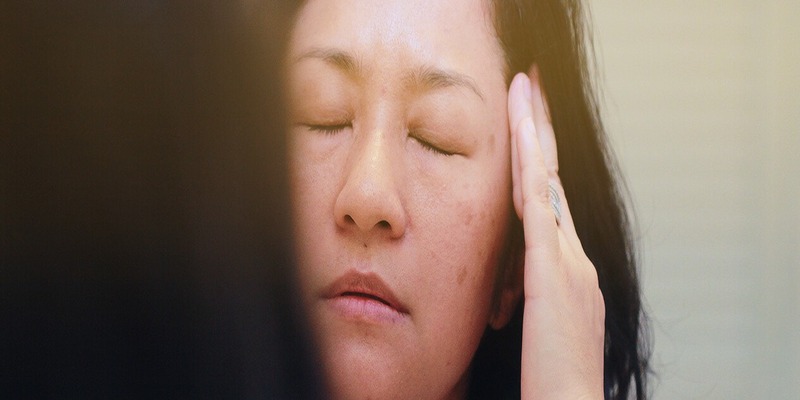When menstruation ceases for a year in a row, it is considered the beginning of menopause. Night sweats are one of the most frequent menopausal symptoms. Most medical problems have natural cures.
When Does Menopause Start And How Long Does It Last?

Around four years before a woman's final menstruation, menopausal symptoms often initially appear. Four years following a woman's last menstruation is not uncommon for symptoms to persist.
Menopausal symptoms can begin as much as a decade before menopause begins, and for around 10% of women, they continue for another 12 years after the last period. Menopause typically begins at about 51. However, it can start up to two years sooner for some minority groups. When it comes to menopause, more research is needed, especially about women of colour.
Menopause onset can be affected by both genetics and ovarian health, among other things. The transitional period preceding the onset of menopause is known as perimenopause. The transition towards menopause is marked by a period of hormonal change known as perimenopause.
Can You Describe The Signs And Symptoms Of Menopause?
The transition through menopause is different for every woman. When menopause happens quickly or in a shorter time frame, the symptoms tend to be more intense. Ovarian conditions, such as cancer or hysterectomy, and lifestyle factors, such as smoking, exacerbate and prolong symptoms. The symptoms of perimenopause, menopause and postmenopause are similar, except for changes in menstruation. Early symptoms of perimenopause include:
- fewer and lighter periods
- irregular bleeding that is either heavier or lighter than usual
- vasomotor symptoms, which might include night sweats, flushing, and hot flashes
Menopause causes hot flashes in about 75% of women.
To What End Does Menopause Occur?
The onset of menopause is a normal part of ageing since a decline in ovarian hormone production causes menopausal symptoms. In reaction to decreased amounts, the body undergoes a series of modifications.
- estrogen
- progesterone
- testosterone
- FSH
- luteinizing hormone
In What Ways Might Menopause Be Identified?
If you're under 45 and having menopausal symptoms, or if your symptoms are very bothersome or disabling, it's essential to discuss them with your doctor. Women experiencing perimenopause symptoms, which can have adverse effects on health, may benefit from this new test.
An increased risk of osteoporosis and fracture, cardiovascular illness, cognitive changes, vaginal changes, loss of libido, and emotional changes are all linked to earlier menopause. Your doctor may also request a blood test to determine your hormone levels, namely FSH and estradiol
Treatments
If your symptoms are severe or reduce your quality of life, you should consider getting treatment. Women under the age of 60 or within the first decade of menopause may benefit from hormone therapy for the prevention or treatment of:
- Flashes of heat
- Nighttime perspiration
- flushing
- sagging vaginum
- osteoporosis
More specific menopausal symptoms, such as hair loss and vaginal dryness, may be treated with other drugs.
Natural Treatments And Behavioural Adjustments

Home cures, changes in lifestyle, and alternative therapies can help with mild to moderate menopausal symptoms. Symptoms of menopause can be alleviated with these at-home remedies:
Maintaining a Stable Body Temperature and Soaring Comfort
Nighttime and warm or erratic weather conditions call for relaxed, layered attire. This can alleviate the discomfort of hot flashes. It is also recommended to avoid sleeping under too many layers of clothing or blankets at night to avoid night sweats.
You should use a waterproof sheet every night to prevent any damage to your mattress from work. Bring a small portable fan with you if you feel hot and flushed.
Physical Activity And Weight Management
Cutting 400 to 600 calories per day might be helpful for weight management. Getting 20 to 30 minutes of moderate exercise is also recommended. If you do this:
- invigorate yourself
- encourage a more restful night's sleep
- uplift spirits
- improve your health in general.
Expressing Your Wants and Needs
If you are experiencing symptoms of depression, anxiety, melancholy, loneliness, sleeplessness, or a shift in your sense of who you are, it is essential to get professional help. Also, it might help to open up to those closest to you about the challenges you're facing, such as anxiety, mood swings, or sadness, so that they can better meet your needs.
Conclusion
A woman's menstrual cycle will cease to occur on its own at some point in her life; this is known as menopause and signifies the end of fertility. Menopause typically begins at about age 52; pelvic or ovarian injury might result in premature menopause.
A woman's menstrual cycle may start prematurely due to hereditary factors or underlying health issues. In the years leading up to menopause, many women suffer the usual menopausal symptoms of hot flashes, night sweats, and flushing.
It's not uncommon for symptoms to linger for four years or more following menopause. If your symptoms are severe or negatively impact your daily life, you may want to consider treatment options, including hormone therapy.

How to cope with the stress of social isolation: A Complete Guide
Oct 15, 2024

It Would Be Best If You Kept In Mind Menopause Causes A Jump In Cholesterol
Nov 02, 2023

Aspects You Should Do To Maintain Your Health Before The First Trip
Dec 19, 2023

What Are the Causes of Chronic Migraine?
Oct 26, 2023

5 Anxiety-Reducing Breathing Exercises
Feb 28, 2024

Everything You Need To Know About The Gerd-Related Health Complications
Jan 19, 2024

Menopause's Negative Repercussions
Feb 10, 2024

Daily Harvest: A Dietitian's Sincere Analysis
Dec 20, 2023

Why You Shouldn't Drink "Healthy Coke" If You Care About Your Teeth or Stomach
Feb 08, 2024

What Is a Meniscal Cyst
Dec 13, 2023

How Long Does The Flu Shot Take To Start Working?
Jan 30, 2024

High-Fat Foods That Are Good For Your Health
Nov 07, 2023